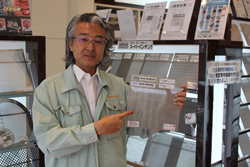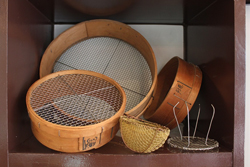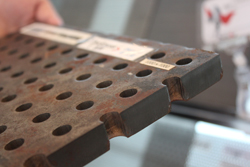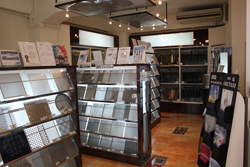Meet Japanese Companies with Quality
OKUTANI WIRE NETTING,MFG,CO.,LTD.
Website: OKUTANI WIRE NETTING,MFG,CO.,LTD.![]()
Category: Japanese Machinery
A family business since 1895
Kobe-based Okutani Wire Netting, Mfg, Co., Ltd. possesses well over a century of experience working with metal products, with roots that reach back to 1895. In the days before machines and automation, the family business was engaged in weaving metal wire by hand to create netting and mesh products such as strainers, baskets, cages and ladles, examples of which are on display in the company's Kobe showroom. Yet as the times changed, Okutani Wire Netting's literal handiwork became produced mechanically and, in 1967, the company started "metal punching," or perforated metal operations. It eventually outsourced much of its wire mesh products to original equipment manufacturers.

Executive director, Tomohiko Okutani

Some of the company's original handmade wire products
In-house focus on perforated metals
Perforated metal-referring to a metal sheet that's punched with holes in a uniform pattern-proved to be an area in which the company could distinguish itself. Okutani Wire Netting's products are now used in countless applications such as machine covers, automobile parts and industrial strainers, all with varying sizes of holes and metal sheet thickness; some sheets used in pharmaceutical applications, for instance, have holes so small that a magnifying glass is needed to see them.
Hole diameter smaller than material width
Okutani Wire Netting's research and development later came up with its trademarked Super Punching technology that "goes beyond the limits" of most conventional perforated technology. Tomohiko Okutani, the executive director, says his technology has "the ability to bore holes with diameters smaller than the thickness of the metal sheet." It's also capable of perforating holes in stainless steel, a particularly challenging metal to work with.
Improved durability and resistance to pressure
Okutani says material perforated by machine increases product strength over material that has been weakened or distorted through a laser or plasma cutting process. Moreover, thicker metal is less susceptible to damage and therefore needs to be changed less often, an attribute greatly appreciated by Okutani Wire Netting's customers who build critical facilities such as nuclear plants, crude-processing factories and wastewater treatment works.

The company can perforate holes with diameters smaller than the thickness of the metal sheet

The showroom features more than 1,000 items
Offices in North America and Europe
Okutani credits the internet for his company's success in venturing outside the Kansai area over the past decade and gaining customers throughout Japan. He's also been proactive in spreading the word about his Super Punching technology. In addition to attending sheet metal working and other types of trade shows overseas starting about three years ago, the company established its overseas presence in Chicago, Illinois in the U.S. and more recently in Dusseldorf, Germany.
A showroom of over 1,000 items
Okutani encourages visitors to stop by the Kobe headquarters. The company's diverse capability that also extends to perforating high-tech plastics can be seen up close in their first-floor showroom that features more than 1,000 items.
Website: OKUTANI WIRE NETTING,MFG,CO.,LTD.![]()



